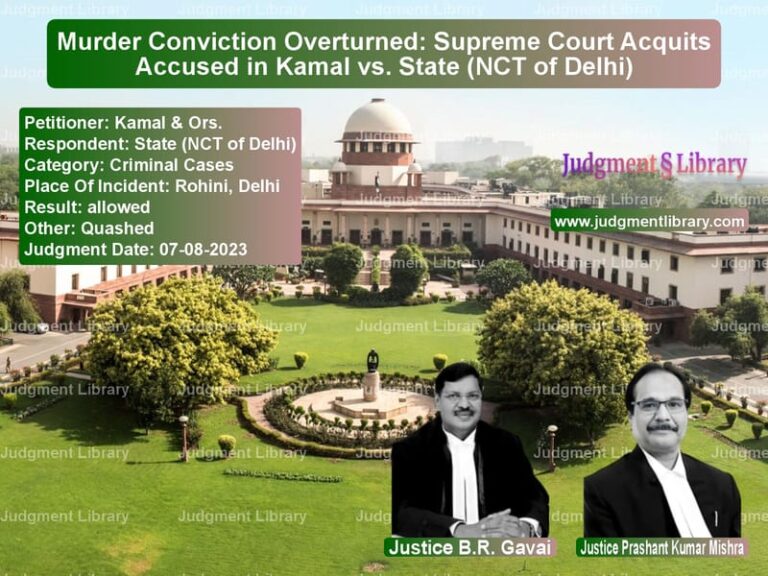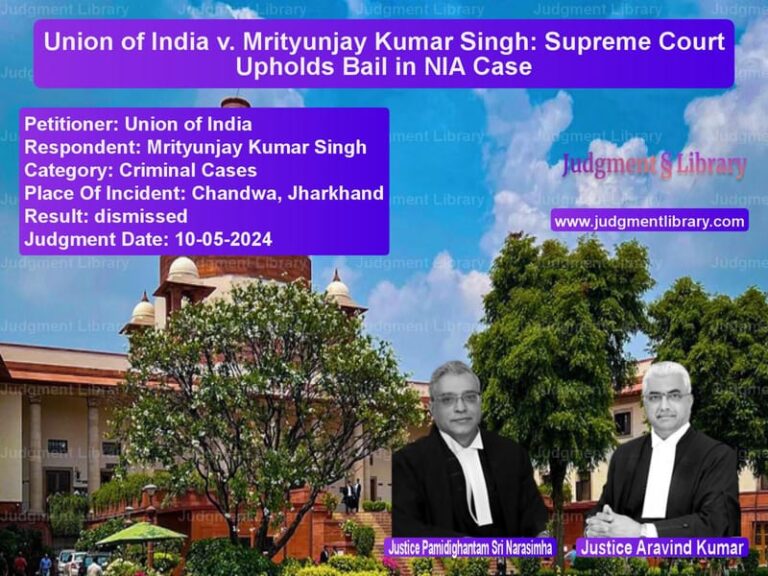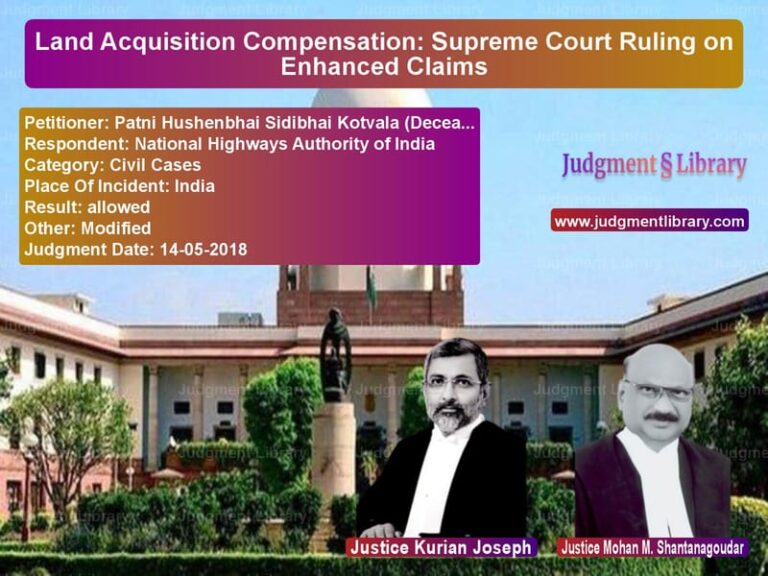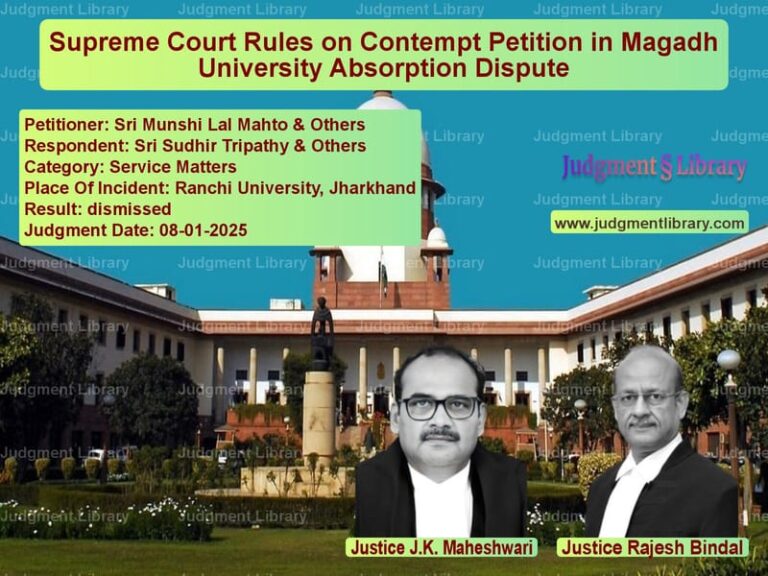Service Recognition and Seniority Dispute: Supreme Court Verdict on Past Service and Benefits
The case of Union of India vs. O.T. Anthrayose concerns a dispute regarding the recognition of past service and seniority for an employee in the Directorate General of Supplies & Disposals (DGS&D). The appellant, Union of India, contested the decision made by the Central Administrative Tribunal and the High Court, which granted the respondent, O.T. Anthrayose, the benefit of past service and seniority from the date of joining DGS&D, including the associated financial benefits.
The Supreme Court was called upon to decide whether the lower courts’ decisions were correct in recognizing the respondent’s previous service and granting him seniority, or whether such recognition was legally unjustifiable.
Background of the Case
O.T. Anthrayose, the respondent, had been employed under the Directorate General of Supplies & Disposals (DGS&D). He had previously served in another department before being absorbed into DGS&D. When he joined DGS&D, he was granted seniority and benefits based on his previous service. However, the Union of India objected to the conferment of these benefits, arguing that his earlier service should not be counted for purposes of seniority and benefits under the DGS&D employment terms.
The respondent approached the Central Administrative Tribunal (CAT), which ruled in his favor, directing the Union of India to recognize his past service and grant him seniority accordingly. The Union of India then appealed the decision to the High Court, which upheld the CAT’s ruling. Subsequently, the case reached the Supreme Court for final adjudication.
Petitioners’ Arguments
The appellant, Union of India, represented by legal counsel, put forth the following arguments:
- The respondent’s prior service was not directly applicable to the current position in DGS&D, and therefore, should not be counted for seniority purposes.
- The decision of the CAT, as upheld by the High Court, was legally erroneous and against established administrative norms regarding the recognition of previous service.
- The grant of seniority based on past service would set a dangerous precedent, encouraging similar claims from other employees, which could disrupt administrative functioning.
- There was no provision in the relevant rules or employment guidelines that allowed for the automatic recognition of past service for seniority purposes.
Respondents’ Arguments
The respondent, O.T. Anthrayose, represented by his counsel, argued:
- When he joined DGS&D, his prior service in another department was recognized, and it was unreasonable to exclude it for purposes of seniority and benefits.
- There was no legal or administrative reason to deny the recognition of his past service, particularly given that he had already been granted similar benefits by the Department at the time of his joining.
- The CAT and the High Court had correctly interpreted the relevant regulations and the principle of fairness, which required that employees not be disadvantaged based on technicalities in cases of departmental transfers.
- The denial of past service recognition would cause severe hardship and unfairly deprive him of legitimate seniority and financial benefits.
Supreme Court’s Observations and Judgment
The Supreme Court, after hearing arguments from both sides, made the following key observations:
- “We are not inclined to exercise our jurisdiction to interfere with the concurrent findings rendered by the Central Administrative Tribunal and the High Court.”
- The Court noted that the appellant had not provided compelling legal or factual reasons to override the decisions made by the CAT and High Court.
- “In the peculiar facts of this case, where the respondent had been employed and continued his service in DGS&D, the recognition of past service and seniority was justifiable.”
- The Court emphasized that employees should not be penalized for legitimate prior service when their transfer or absorption into another department or organization was done according to proper legal procedures.
- The Supreme Court made it clear that, while the recognition of past service and seniority was not automatic, in this case, the decision of the lower courts was reasonable, and the appeal by the Union of India had no merit.
Therefore, the Court dismissed the appeal, leaving the lower courts’ rulings intact. The respondent was entitled to seniority and all consequential benefits, including the financial advantages resulting from the recognition of past service.
Key Legal Takeaways
The Supreme Court’s ruling established several important principles regarding seniority, service recognition, and employee rights:
- Recognition of Past Service: When an employee is transferred or absorbed into a new department, prior service may be recognized if done according to established legal processes.
- Fairness in Administrative Decisions: Employees who have been fairly appointed and given benefits should not be deprived of those benefits unless there is a clear legal reason.
- Jurisdiction of High Courts and Tribunals: The decisions of tribunals and lower courts regarding service matters, particularly in the case of transfers and seniority, should not be interfered with unless there is an error of law or facts.
- Legal Precedents: The ruling reinforces the legal principle that seniority should not be arbitrarily denied to employees, especially when they have contributed years of service without any gaps or interruptions.
Impact of the Judgment
The Supreme Court’s decision has important implications for government employees and their service rights:
- Employees in government departments or similar organizations can now expect fair consideration of their past service when seeking promotions or benefits under new appointments.
- It sets a precedent that allows employees to claim recognition for past service, provided it is legally justified, ensuring fairness in administrative practices.
- The judgment emphasizes the importance of maintaining the integrity of the service record, preventing arbitrary denials of benefits to employees.
Conclusion
The Supreme Court’s decision in Union of India vs. O.T. Anthrayose upholds the principles of fairness and justice for employees, ensuring that legitimate past service is recognized when determining seniority and benefits. The ruling clarifies that employees should not be deprived of the advantages of their previous work history when transferring or being absorbed into new positions within the government or public sector. This judgment provides an important precedent for future cases involving service recognition and seniority disputes.
This case serves as a reminder of the significance of procedural fairness in public employment and the need for judicial oversight to ensure that employees are treated equitably.
Don’t miss out on the full details! Download the complete judgment in PDF format below and gain valuable insights instantly!
Download Judgment: Union of India vs O.T. Anthrayose Supreme Court of India Judgment Dated 13-07-2017.pdf
Direct Downlaod Judgment: Direct downlaod this Judgment
See all petitions in Pension and Gratuity
See all petitions in Employment Disputes
See all petitions in Promotion Cases
See all petitions in Judgment by Kurian Joseph
See all petitions in Judgment by R. Banumathi
See all petitions in dismissed
See all petitions in supreme court of India judgments July 2017
See all petitions in 2017 judgments
See all posts in Service Matters Category
See all allowed petitions in Service Matters Category
See all Dismissed petitions in Service Matters Category
See all partially allowed petitions in Service Matters Category







